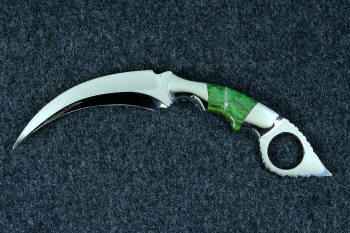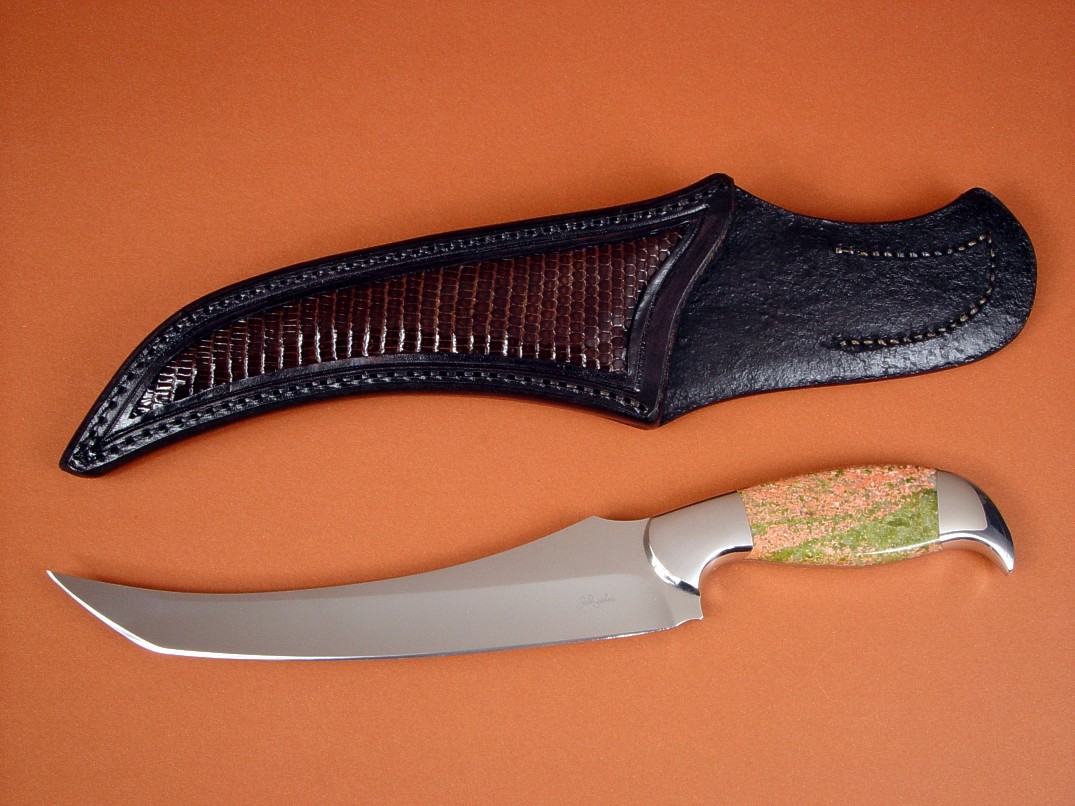Jay Fisher - Fine Custom Knives
New to the website? Start Here

"Raptor"

Thanks, Ulises Magana!
Hello Jay,
I have been using Cybele, holding Cybele, and trying to learn how it was created (specially its edge) by observing.
This is a review of your knife; one of many. To give only one would be a ridiculous insult, it is not a meal that
is eaten and then gone and remembered (I will probably never have a chance to remember this blade of yours and mine,
because it will outlast me). While both a meal and a knife can be masterpieces, the time in which each is experienced
is different. I am glad that you exist.
When I opened the FedEx package I was confused at what I was holding in my hand. Heavy...well heavier. I held it for hours before I cut anything with it, I slapped the blade against my hand, knocked it with my knuckles. I had never experienced a knife made of this steel before. Nor one made this well. Its shape still confused me though. It felt the most natural when held in a forward grip I was unsure if the handle was any good at all. I held my other knives in comparison and soon I started to dislike them. The knives I had had so much experience with and had done things so well with, were nothing in comparison to the cuts full of finesse I was making with Cybele, a knife I had never played with.
I wasn't having to accommodate for the knife, finally the knife was doing as I commanded. I will send you a video so you can see Cybele in action. I have broken down many fish, and I am waiting for a good sized opportunity to test how it will do with a large one (TUNA :) ), since its design is better suited for that. As a Chef knife it falls short because of its height, the amount of clearance in height for your fingers between the edge beginning after the choil and the belly of the knife, and its pivot point has a significantly decreased edge sharpness. Usually with a Chef's knife because it is quite large and tall you are able to easily curl your fingers and rest your proximal joints against the side of the blade. With Cybele this is not possible and the alternative is to rest the top surface of your intermediate phalanges at about 110-120 degree angle. This is not bad but it is not the most desirable for someone like me who can go a great speeds with a knife; the upward force exerted against my fingers can sting and burn from the rubbing. But, I experienced this from the up and down rubbing against my joints from larger Chef knives so the trade of is not bad.
I am a small guy, I am 5 foot 5 inches. My hands are small my fingers are not thick, and I bump or squish my fingers against the cutting board when trying to use the full length of Cybele's edge. Since Cybele has a curved blade the percentage of the actual edge that comes in contact with the surface of the cutting board is about 33%. A percentage similar to this is inherent with almost all cooking knives, but with Cybele in order to use the last third of the cutting edge the handles rear quillon needs to come down millimeters away from the cutting board. This does not leave enough room for my fingers. So, I have to remove them from the belly of the knife and switch to a glide grip (where the blade is held by the sides), again not bad; but not Great. Then, usually the Chef's knife pivot point is at the tip of the blade, in Cybele there exists two pivot points (the stinging trailing point (I think that's what its called) and the transition point/tanto blade ) The one usurping the traditional tip of a Chefs knife is that transition point; it is not as sharp as the rest of the blade. Dragging the knife along this point can cause ripping and not cutting of food stuff (though I see that the primary edge was continued farther up well into the beginning of the secondary edge).
-8/12/12
I wrote the previous paragraph thinking I understood Cybele having used it. But, cutting with it is a delightful experience. Every cut is
exact, every slice is even, every dice looks like it was machine cut, and every piece of food minced has absolutely defined borders. Cybele
is not the sharpest, fastest, thinnest; but overall it is the best by very very VERY far.
Usually you would expect to teach the blade. Use it wear out the edge, train the edge, smooth in the middle from wear and deliciously sharp
at the tip from occasional wear. The change in
Cybele's edge is the least detectable that I have ever experienced. Knives to me are like nails to fingers, I can feel exactly where every
part of the knife is. I have never had a blade with such a great fit. I hate hidden tang blades for this reason (but
I'll hold my tongue since I have not had yours), the transference of force is not good. Often the transition and loss of force from blade,
to handle, from handle to hand is to great. Even with full tang forged blades I have never had such great transference of energy. I was
never a butcher, and I now am able to crack atoms and see inside them with Cybele.
It is a very releasing experience to use Cybele while cooking because the blade has tamed me, Cybele has taught me. I am incredibly fast and precise with every knife that I own, but I have never felt the need to slow down and enjoy the cut. A lot of the problems I faced with my fingers not having enough space were almost all gone because I reduced the speed of my cutting.
All my blades have "para aprender" etched on them that only I can see, Cybele is the only blade that has it physically engraved. The reason for it being written in Spanish is because of its double meaning; for the sake of learning and for learning with (meaning Cybele is a tool to be used for learning).
-9/6/12
Thank you so much, I want to continue ordering and working on the rest of my future knives with you. It is a great feeling to come home
tired as hell from a 16 hour shift and go to my kitchen and cook for even longer and more enjoyable hours than ever before. I want you to
do me a favor, if you will allow it; every time I purchase potential (a knife) from you I want you to put my full name on the page of every
knife that I purchase from you. I am a proud owner of your work!
We need to have a long talk as to how this project of mine is going to come to fruition.
thank you,
Ulises Magana
| Main | Purchase | Tactical | Specific Types | Technical | More |
| Home Page | Where's My Knife, Jay? | Current Tactical Knives for Sale | The Awe of the Blade | Knife Patterns | My Photography |
| Website Overview | Current Knives for Sale | Tactical, Combat Knife Portal | Museum Pieces | Knife Pattern Alphabetic List | Photographic Services |
| My Mission | Current Tactical Knives for Sale | All Tactical, Combat Knives | Investment, Collector's Knives | Copyright and Knives | Photographic Images |
| The Finest Knives and You | Current Chef's Knives for Sale | Counterterrorism Knives | Daggers | Knife Anatomy | |
| Featured Knives: Page One | Pre-Order Knives in Progress | Professional, Military Commemoratives | Swords | Custom Knives | |
| Featured Knives: Page Two | USAF Pararescue Knives | Folding Knives | Modern Knifemaking Technology | My Writing | |
| Featured Knives: Page Three | My Knife Prices | USAF Pararescue "PJ- Light" | Chef's Knives | Factory vs. Handmade Knives | First Novel |
| Featured Knives: Older/Early | How To Order | 27th Air Force Special Operations | Food Safety, Kitchen, Chef's Knives | Six Distinctions of Fine Knives | Second Novel |
| Email Jay Fisher | Purchase Finished Knives | Khukris: Combat, Survival, Art | Hunting Knives | Knife Styles | Knife Book |
| Contact, Locate Jay Fisher | Order Custom Knives | Serrations | Working Knives | Jay's Internet Stats | |
| FAQs | Knife Sales Policy | Grip Styles, Hand Sizing | Khukris | The 3000th Term | Videos |
| Current, Recent Works, Events | Bank Transfers | Concealed Carry and Knives | Skeletonized Knives | Best Knife Information and Learning About Knives | |
| Client's News and Info | Custom Knife Design Fee | Military Knife Care | Serrations | Cities of the Knife | Links |
| Who Is Jay Fisher? | Delivery Times | The Best Combat Locking Sheath | Knife Sheaths | Knife Maker's Marks | |
| Testimonials, Letters and Emails | My Shipping Method | Knife Stands and Cases | How to Care for Custom Knives | Site Table of Contents | |
| Top 22 Reasons to Buy | Business of Knifemaking | Tactical Knife Sheath Accessories | Handles, Bolsters, Guards | Knife Making Instruction | |
| My Knifemaking History | Professional Knife Consultant | Loops, Plates, Straps | Knife Handles: Gemstone | Larger Monitors and Knife Photos | |
| What I Do And Don't Do | Belt Loop Extenders-UBLX, EXBLX | Gemstone Alphabetic List | New Materials | ||
| CD ROM Archive | Independent Lamp Accessory-LIMA | Knife Handles: Woods | Knife Shop/Studio, Page 1 | ||
| Publications, Publicity | Universal Main Lamp Holder-HULA | Knife Handles: Horn, Bone, Ivory | Knife Shop/Studio, Page 2 | ||
| My Curriculum Vitae | Sternum Harness | Knife Handles: Manmade Materials | |||
| Funny Letters and Emails, Pg. 1 | Blades and Steels | Sharpeners, Lanyards | Knife Embellishment | ||
| Funny Letters and Emails, Pg. 2 | Blades | Bags, Cases, Duffles, Gear | |||
| Funny Letters and Emails, Pg. 3 | Knife Blade Testing | Modular Sheath Systems | |||
| Funny Letters and Emails, Pg. 4 | 440C: A Love/Hate Affair | PSD Principle Security Detail Sheaths | |||
| Funny Letters and Emails, Pg. 5 | ATS-34: Chrome/Moly Tough | ||||
| Funny Letters and Emails, Pg. 6 | D2: Wear Resistance King | ||||
| Funny Letters and Emails, Pg. 7 | O1: Oil Hardened Blued Beauty | ||||
| The Curious Case of the "Sandia" |
Elasticity, Stiffness, Stress, and Strain in Knife Blades |
||||
| The Sword, the Veil, the Legend |
Heat Treating and Cryogenic Processing of Knife Blade Steels |